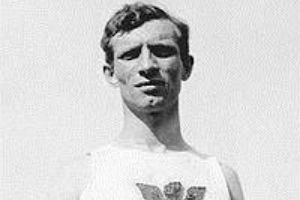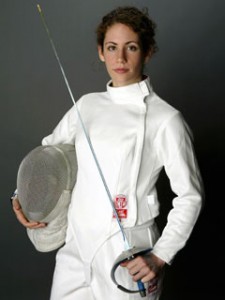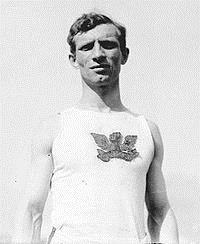Jewish Olympians

Blog post by Executive Director Marvin Pinkert. To read more posts from Marvin click HERE.
This weekend I read an article in the Washington Post entitled “Sorry, Rio, but London and Beijing have ruined Opening Ceremonies for everyone” making an invidious comparison between past Olympic spectacles and the relatively more modest evening in Rio de Janeiro. It got me thinking about how this event went from an international amateur competition to a major made-for-tv extravaganza.
One turning point was David Wolper’s production of the 1984 LA Games complete with John Williams’ theme music and a visit from a flying saucer. An earlier, and much darker turning point, were Hitler’s 1936 Berlin Games and the beginnings of the games as an expression of national “virtues.” If you go back further, the games were a much more modest affair.
I turned to Paul Yogi Mayer’s book, Jews and the Olympic Games, for some insight into Jewish participation in the early modern Olympics. Put the words “Jewish” and “Olympics” in the same sentence and the likely rejoinder is champion swimmer Mark Spitz. Some may have memories of the tragic loss of Israeli team members at Munich and movie goers may still recall Harold Abrahams, the British runner whose story became Chariots of Fire. But in fact, according to Mayer there have been Jewish medalists in every Olympics since the revival of the modern games in Athens in 1896 and in every summer Olympics at least one Jewish gold medal winner. Historically, swimming is only the second highest sport for Jewish medalists. What’s number one? Fencing, go figure. He calculates 47 medals in total in fencing – from Austrian bronze-medalist Siegfried Flesch in 1900 to Russian gold-medalist Sergei Sharikov in 2000 (the late Mr. Sharikov won one more bronze medal in 2004 after Mayer’s book was written – American fencer, Sada Jacobson has won three medals since 2004 – moving the current Jewish fencing total to 51 – that’s a lot of swordplay).

But of the earliest Jewish Olympians, three stories stood out to me. The first was Alfred Flatow, a German athlete who captured the first ever gold medal parallel bars and along with his cousin Gustav-Felix Flatow won two of the first team medals for gymnastics in Athens in 1896. In 1903, Alfred helped found of the Judische Turnerschaft, a Jewish fraternity that promoted Jewish participation in sports. He was prominently active in German gymnastics until he “voluntarily” gave up his gymnastics club membership in 1933. In 1938 the Flatow’s escaped to the Netherlands. Following Nazi occupation of Holland, the Flatows (over the protest of German gymnastics officials) were sent to Theresienstadt. There Alfred died in 1942; his cousin Felix in 1945.

The first Jewish American to win a gold medal was Myer Prinstein in Paris in 1900. Myer’s specialties were the triple jump and the long jump. The Polish born Prinstein was five years old when he came to America. He was captain of the Syracuse University track team. In deference to his Methodist school he honored his commitment not to compete in the Olympic final on a Sunday. His Christian teammate Alvin Kraenzlein did not feel so constrained. So Kraenzlein took the gold in the long jump and Prinstein had to settle for a silver (based on his performance in the preliminaries). Four years later in St. Louis he played for the Irish American Athletic Club (which apparently had no sabbath constraint), took the gold in both the triple jump and the long jump, setting a new Olympic record of 7.34 meters (by comparison, the 2012 long jump winner went 8.31 meters – still Prinstein’s jump would be among the top 35 qualifiers even a century after he made it)

The last of the early athletes that attracted my attention was Sam Berger – Olympic gold medalist in Heavyweight Boxing in 1904. Berger was born in Chicago but raised in San Francisco. Berger was 6’2″ and 200 lb. and had won most of his bouts as an amateur in California. It is not surprising that America won the first boxing gold medal – America was the only country that entered the competition! Berger was not able to turn his Olympic success into a comparable professional career. A disastrous fight in 1906 ended his quest for a pro championship. He would later serve as sparring partner for Jim Jeffries as he prepared for his challenge to Jack Johnson. He evidently did much better as a businessman than as a boxer, parlaying his interest in his brothers’ clothing store into $1 million by the time he died in 1925.
So when you are watching this year’s competitors in Rio, like gymnast Aly Raisman and fencer Eli Dershwitz, know that they are a part of a very long tradition.
